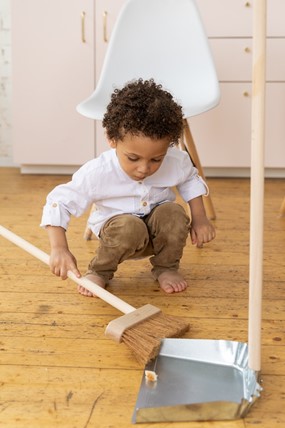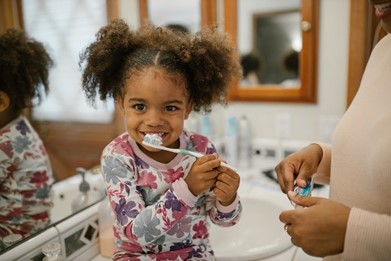You Grow, Kid! Parenting Advice to Help Your Four to Six-Year-Old Become More Independent
Raising a little human is one of life’s greatest honours, but that doesn’t mean there’s no stress involved. In fact, during certain times, you’ll likely find that it’s one of the most stressful things you’ll ever do! This becomes especially apparent when they begin to phase out of their terrible twos and into a territory where they should be able to start ticking off certain tasks without parental supervision.
 It’s an overwhelming stage that can fill you with both pride and anxiety...but take a deep breath! Experts at Oceans have put together some parenting advice to help you assist your four to six-year-old in becoming a brighter, more independent spark.
It’s an overwhelming stage that can fill you with both pride and anxiety...but take a deep breath! Experts at Oceans have put together some parenting advice to help you assist your four to six-year-old in becoming a brighter, more independent spark.
How do you know when your child is ready?
Every child is different, and often a “one size fits all” mentality doesn’t work here. That being said, you can look towards expert guidance to determine what’s usually expected during each stage of your child’s development.
For instance, it’s believed that children from four to six years old first begin to develop their independence, as well as form real friendships and grow important life skills. This could be a good indicator of when you should at least test the waters to see if your child can carry out basic duties independently.
Some tasks they should begin to try alone
Feeding themselves
It’s crucial you understand how valuable this step is in their evolution, as it’s thought that growing and encouraging self-feeding skills is just as important as the nutrition they’re consuming.
At the four-year mark, your little one should begin developing self-feeding skills that include eating with a fork and using it to prick items.
Between the ages of five and six, your child should have the ability to butter their own bread as well as use a knife (that isn’t super sharp!) to cut food items such as vegetables and meat.
It’s important to be patient during this period and accept the fact that mess is almost guaranteed. Let them explore their potential and get an understanding of how things work...practice makes perfect!
Going to the toilet alone
Potty training is an adventure, to say the least. As a parent, putting the nappies to one side – especially when it’s for the final time – is a huge milestone, and one that really signifies the independence of your child.
Knowing how to wipe their own bottom with little to no help from an adult should take place between the ages of three and five, and there are steps you can take to ensure that they reach this breakthrough accurately and effectively.
Help them to understand good sitting balance, how to fold the toilet roll, and the correct wiping motion. The most significant step in this toilet training adventure is to teach them how to know when they’re completely clean. This should mark the end of the potty-training process!
Jordan Kelly, brand marketing manager at Oceans, said: “This could also be a fantastic opportunity to teach your little one about the importance of looking after the environment. Choose responsibly sourced toilet paper and educate them on what makes it so special and how it contributes to a happier, healthier planet.”
 Chores
Chores
It may seem like a child of four, five, or six is too young to start doing tasks around the house, but it’ll benefit them in the long run. Teaching your child about the importance of carrying out various chores is a powerful way to demonstrate responsibility and self-reliance.
There are various age-appropriate duties your little one can begin getting to grips with, and as a result, their independence will soar!
Making their bed, emptying paper bins, and pulling weeds are all suitable chores for a child aged four to six. At first, you can have them shadow you to see how it’s done properly, and then encourage them to do the same actions without supervision.
Brushing teeth
By four years old, your infant should be brushing their teeth both morning and night – but be present while they do so. To help them succeed, brush your teeth alongside them so they can see the correct process.
If you’re struggling to keep them engaged with the activity, let them pick their own toothbrush and toothpaste so that they feel more in control, and consider giving out a reward each time they do the job well and with little to no fuss.
Brushing should still be supervised during ages five and six to ensure the teeth have been properly and accurately cleaned.
Top tips to encourage independence during these tasks
Support without handholding
During these crucial stages, you might find it a little hard to let go – and that’s completely understandable! It is fundamental, however, that you try your best to resist the urge to ‘hold their hand’ throughout each process, even if you think they need it. You can support them in other ways, including giving praise and rewards, and setting a good example.
 Let them fail
Let them fail
Hey, mistakes are going to happen one way or another, so you might as well just let them. It’s impossible to protect them from failure, and it isn’t a good idea to try, either. Making mistakes gives them a key opportunity to develop their critical thinking and problem-solving skills, and they’ll naturally get better at each task the more that they do it.
Praise their efforts
This journey is as much overwhelming for them as it is for you, so be generous with your praise and make sure it’s given when it’s due. Verbal praise is powerful, letting them know that you’re proud of their efforts and delighted with the outcome, but it could also be a good idea to give rewards in the shape of trips to their favourite restaurants, a new toy, or even just a sticker.
You’ve got this!
They really, really do grow up so fast, don’t they? One minute they’re in nappies with gummy smiles and completely dependent on you, and the next, they’re marching around the house doing things for themselves. It can be scary, we know, but it’s an unavoidable step that will help them become better, stronger people in the future.
Follow the above advice to help your mini-me become a successful bigger-me. You’ve got this!